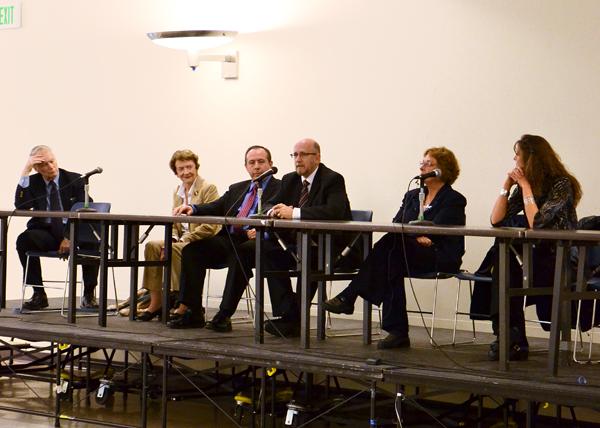
A panel of experts from a variety of fields — including law enforcement, psychology, medicine, social work, forensic science, sociology and women’s studies — gathered on campus Sunday to discuss the topic of “sexual homicide.”
The panel discussion served as a preview to a two-day conference on the subject at the Holiday Inn Arena & Conference Center in Downtown Binghamton that began yesterday and continues today. Both were organized by Binghamton University’s continuing education department.
The conference, “First Annual International Multidisciplinary Collaborative Conference on Violence Research & Evidence-Based Practice: Sexual Homicide” is the first in the country to address the topic of sexual homicide, according to Mary Muscari, an associate professor in the Decker School of Nursing and a coordinator of the event.
Registration for the conference costs $160 for the general public and $100 for law enforcement officials and students, faculty and staff of BU. Sunday’s panel discussion, which took place at 4 p.m. in the Old Union Hall, was free of charge.
Muscari said Sunday’s panel was intended to allow students to connect with the experts.
“The conference itself is a separate event,” she said. “We are running two things, but we wanted to give students the time on their own to speak to speakers.”
The seven experts on the panel discussed their respective professional fields and took questions from the audience of 14, which included undergraduates and graduates from BU, University at Albany, SUNY Oneonta and the local residents.
Ann Burgess, a professor of psychiatric mental health nursing at Boston College, said she expected the panel talk and conference would spread awareness about sexual homicide.
“[The event’s purpose is] to interest students in the field of criminal psychology, forensics and victimology and to provide some violence research findings on sexual homicide to a university student population emphasizing the expanding field of forensics and technology,” Burgess wrote in an email.
Muscari called the conference a rare opportunity.
“These speakers are some of the most prominent in the field and biggest names in the world,” she said.
During Sunday’s talk, an audience member asked the panel to define the term “sexual homicide.”
Tara Henry, a panel member who specializes in the field of forensic nursing, said the term “refers to a sexual assault that takes place surrounding a murder.”
Leonard Morgenbesser, an adjunct faculty member in the social work graduate program at Empire State College, member of the panel and another coordinator of the conference, said the term is difficult to define because of how cases are categorized.
“Part of the problem is the way our criminal justice system works,” Morgenbesser said. “Someone commits one of these crimes and they are tossed into the system as a homicide offender, but the original charges may have been sexual assault. You have to do some fancy footwork in the system that houses them; you can’t just plug in a code.”
Muscari said the panel was meant to take an interdisciplinary approach to the topic.
“Well, I think some students are deciding their fields and their research — it’s important to see how many careers there are in this field,” she said. “This is a good opportunity regarding the careers surrounding sexual homicide because it covers many disciplines.”
Muscari said she was surprised by how many experts were interested in participating in the conference. Originally the conference was to include speakers mainly from BU, but experts from around the country contacted Muscari to participate.
She said she hopes to coordinate similar panels in the future and has tentative plans for a conference on the topic of murder-suicides to be held in 2012.
Dallas Drake, a criminologist, author, educator and co-founder of the Center for Homicide Research, discussed methodologies of analyzing a sexual homicide crime scene and detecting the behavior of an offender.
“There are red flags of a crime scene; when we look at the evidence of the crime scene, we can’t always tell what’s wrong with it, but we can see that the pieces aren’t fitting together,” Drake said. “The first sign there is a problem is when there is implicit and intuitive sense that there are pieces that just don’t fit together.”
Russell Strand, chief of the family advocacy law enforcement training division at the U.S. Army Military Police School, talked about difficulties in cracking sexual homicide cases.
“As human beings, we want things to make sense,” Strand said. “These offenders are good at hiding their personality and often study us more than we study them. They are very intuitive about what they want us to hear and see. The sad part is, they are so good at what they do.”


